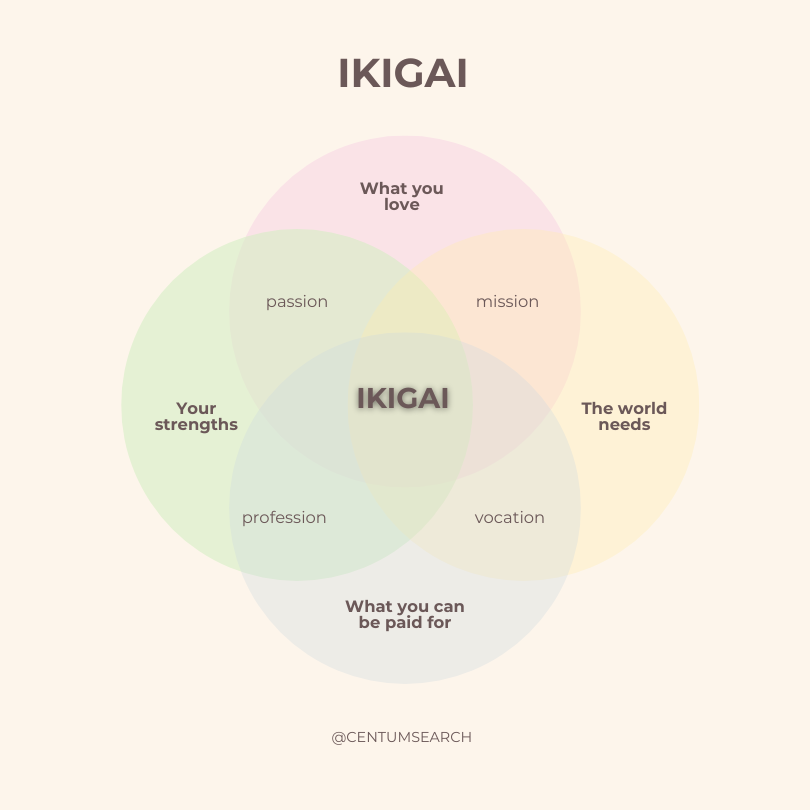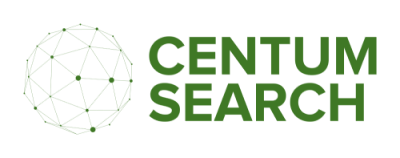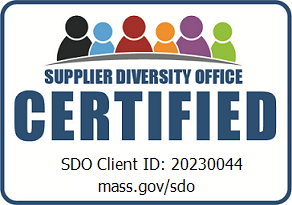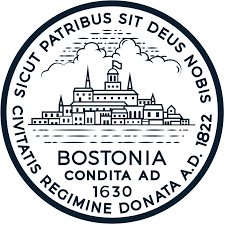Using Ikigai for Meaningful Hiring and Careers
What is Ikiagi and how can it be used as a hiring and job-seeking tool.

What is Ikigai?
Ikigai (生き甲斐, pronounced "ee-kee-guy") is a Japanese concept that gives a person a sense of purpose or a reason for living. The word combines two Japanese terms: "iki" (生き) meaning life, and "kai" (甲斐) meaning effect, worth, or benefit.
Ikigai is found at the intersection of four elements:
- What you love
- What you’re good at
- What the world needs
- What you can be paid for
When all four components are present, a person is said to have found their ikigai or "reason for being". This concept encourages individuals to reflect on these aspects of their lives to discover a sense of purpose and fulfillment.
The concept dates back to the Heian period (794-1185) and gained wider attention through Mieko Kamiya's 1966 book Ikigai-ni-tsuite (About Ikigai). More recently, Ikigai: The Japanese Secret to a Long and Happy Life by Héctor García and Francesc Miralles has brought global attention to the idea.
Ikigai is believed to contribute to the longevity and well-being of Japanese people, particularly in Okinawa. It encourages individuals to engage in activities they enjoy, even after retirement, fostering a sense of purpose and improved health.
Ikigai is not a fixed destination but an evolving concept, recognizing and nurturing various sources of meaning and joy throughout life.
The Connection Between Ikigai and Work
As the majority of our waking moments are spent at work, it's important to consider Ikigai while reflecting on hiring alignment and career fulfillment. This 4 element framework benefits both job seekers and hiring managers. When employees find roles that align with their Ikigai, they feel more engaged and motivated, leading to better performance and longer tenure. Companies, in turn, build stronger, more dedicated teams.
The modern workforce, especially in tech, values purpose beyond salary. Many professionals seek roles that challenge them intellectually and allow them to contribute meaningfully—whether through innovative technology, problem-solving, or mission-driven work. When employees feel disconnected from their work’s purpose, they are more likely to disengage, leading to lower productivity and higher turnover.
For hiring leaders, Ikigai can be a guiding principle for structuring hiring decisions, ensuring candidates align with the company’s mission and values. When employees connect with the company’s purpose, they are more motivated, innovative, and committed. On the other hand, job seekers can use Ikigai principles to guide career choices, balancing financial stability with roles that bring meaning and fulfillment.
Applying Ikigai in Hiring and Career Decisions
For Hiring Leaders: Hiring for mission fit, not just skills – Beyond technical ability, evaluate whether a candidate’s values align with your company’s mission.
Interview questions for assessing Ikigai alignment:
What type of work excites you the most?
Can you describe a project where you felt truly fulfilled?
What impact do you hope to have in your career?
Employees are more likely to stay with a company when their work has meaning and aligns with their values. By fostering an environment where employees engage in projects that resonate with their Ikigai—what they love, what they excel at, what the world needs, and what they can be paid for—organizations improve job satisfaction and retention. Encouraging professional growth, providing opportunities to work on impactful projects, and ensuring employees see the tangible results of their contributions leads to a more engaged and motivated workforce.
Research from Gallup and Harvard Business Review indicates that employees who find meaning in their work are more productive and exhibit higher retention rates. A Gallup study found that employees who feel connected to their company's mission are 3.5 times more likely to be engaged. Additionally, a Harvard Business Review study highlights that organizations fostering a sense of purpose see improved job satisfaction and lower turnover.
For Job Seekers:
Questions to evaluate whether a job aligns with your Ikigai:
- Does this role involve work you love doing?
- Do your skills match the position’s needs?
- Does the company’s mission align with your values?
- Is the compensation fair and sustainable for your life goals?
While a high salary can be attractive, it is not always enough to sustain long-term job satisfaction. Without alignment in other Ikigai areas—such as passion, mission, or vocation—employees may feel disconnected and unfulfilled. This misalignment can lead to stress, disengagement, and ultimately burnout. To build a fulfilling and sustainable career, individuals should seek a balance between financial stability and meaningful work that aligns with their strengths and values.
Practical Steps to Use Ikigai in Your Career or Hiring Strategy
For Individuals:
Map out your Ikigai: Draw four overlapping circles representing passion, vocation, mission, and profession. Identify where your current job fits and what’s missing.
Ask these reflection questions before changing jobs:
- What kind of work makes me excited to wake up every day?
- Am I using my strengths effectively?
- Does this career path contribute to something meaningful?
For Hiring Leaders:
Craft job descriptions that attract the right candidates:
- Highlight your company’s mission and how the role contributes to it.
- Describe opportunities for employees to grow in ways that align with their strengths and passions.
Use interviews to uncover a candidate’s Ikigai:
- Ask about past work experiences that brought them joy and fulfillment.
- Understand their career aspirations and long-term goals.
Ikigai isn’t just a philosophy—it can be practical tool for hiring managers and job seekers alike. Companies that intentionally incorporate purpose into their hiring processes attract and retain motivated, engaged employees. Likewise, individuals who align their careers with their Ikigai find greater fulfillment and success.
Whether you’re a hiring manager looking to build a stronger team or a job seeker searching for the right opportunity, Ikigai can help you make better, more meaningful career decisions.
References
Gallup. "State of the American Workplace." Gallup, 2017, https://www.gallup.com/workplace/238085/state-american-workplace-report-2017.aspx.
Groysberg, Boris, et al. "The Value of Belonging at Work." Harvard Business Review, 2021, https://hbr.org/2021/12/the-value-of-belonging-at-work.
Subscribe to our newsletter!
Resources for Careers, Talent Acquisition and Management







